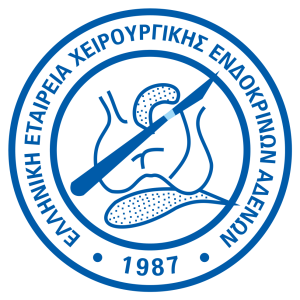INFORMATION SHEET FOR PATIENTS REGARDING PARFLU TRIAL
The use of autofluorescence in endocrine surgery is a new, innovative and promising technique, which is likely to help the surgeon identify and protect parathyroid glands intraoperatively, reducing the possibility of the postoperative need for calcium and vitamin D supplementation.
The application of the method is based on the use of a special camera that works with infrared light and helps the surgeon identify the parathyroid glands.
More specifically, a light source emits almost infrared light at a wavelength of 750 nm to the surgical field. The parathyroid glands at this wavelength show the ability of autofluorescence, i.e. they emit light at a wavelength of about 810-870 nm, which is detected by a special camera, and the images are displayed on a particular screen, where the glands are visible.
The aim of this study is to show whether the use of the autofluorescence method reduces the occurrence of postoperative temporary or permanent hypocalcaemia (temporary or permanent postoperative hypoparathyroidism ), one of the most serious complications in thyroid surgery.
The method is completely safe since:
– It does not require any additional intervention on the patient (surgical or pharmaceutical).
– The patient is not receiving ionizing radiation.
– It does not endanger your health in any way.
-It does not increase surgery time.
The use of this technology is increasing internationally; however, although there is certainty about its safety, there is still not much data on its effectiveness.
At the Endocrine Surgery Department of Henry Dunant Hospital, due to our specialization in this field, we participate in modern international developments and contribute to the progress of endocrine surgery, as we treat a large number of patients each year. That’s why we have started a prospective randomized study to see if this technology helps or not.
By participating in this study, you will also contribute to gaining the necessary knowledge that will help surgeons, internationally, make better use of this new technology.
If you consent to participate in this study (always maintaining your anonymity), there is a 50% chance that this technology will be used in your operating room. For the study’s validity, the selection of patients must be random and automated by a special algorithm, which means that nor you or your doctor will not choose if the autofluorescent technique will be used.
Under no circumstances will you undergo additional tests other than those necessary for the safe outcome of your operation and which, in any case, you would do before and after the surgery.
Participation in this prospective study is voluntary, and if you refuse to participate, this will not affect the care you receive.
According to article 14 of Law 3418/2005 (Code of Medical Ethics), it is mandatory to keep a medical record, which records the details of patients, condition, the reason for visit and results of clinical and outpatient examinations. This record is kept by law for 10 years after your last visit.
The study will maintain your anonymity and will use for statistical analysis only biometric characteristics (Height-Weight-Age), medical history, surgery and other interventions, results of histological reports, laboratory, clinical and paraclinical tests.
Your data will be stored in an electronic file – archive, which will be stored in a computer that will be exclusively for this use. Only the doctors of the Department who are scientifically responsible for this study will have access to this computer. The entry in the computer files will be done using a special code which will be known only to the members of the study. Your data will be used only for statistical analysis, anonymously and for medical research purposes. The data in this study will not be passed on to third parties without your consent.
Mr Kyriakos Vamvakidis, Director of the Department of Endocrine Surgery, will be in charge of storing the data.
As a patient regarding your personal data, according to the General Data Protection Regulation ( GDPR ), you have the following rights:
- Right of access to your data:
The right to know if your data is being processed, how and for what purpose. - Right to correct your data:
The right to request a correction of your personal data if it is inaccurate or incomplete. - Right to delete your data (“right to be forgotten”):
The right to request the deletion or deletion of your personal data under certain conditions and after the expiration of the above mentioned decade. - Right to restrict the processing of your data:
The right to request a restriction on processing your personal data when certain conditions are met. - Right to the portability of your data:
Your right to request your information be sent to a third party (e.g. another doctor).
When you submit a request exercising any of the above rights, the doctor must respond to you within 1 month either by satisfying the right (e.g. by giving you a copy of your medical file) or by reasonably rejecting your request (e.g. refusing a request). since the law obliges the doctor to keep it for 10 years) or explaining the reasons for the delay. However, in any case of delay, the doctor must respond positively or negatively within 3 months of the request.
The application must be in writing, signed and mailed to endocrinesurgery @ dunant . gr or in the secretariat of the Department f. spiliotopoulou @ dunant . gr . If you are not sure how to proceed, please contact the Department Secretariat or your doctor.

